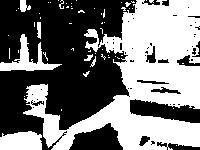
Morgan Rielly is working on his second book based on oral histories
When he was in high school, Morgan Rielly ’18 tracked down World War II veterans living across Maine and spent hours listening to their stories. He wrote profiles based on these oral histories and compiled them into his first book, Neighborhood Heroes: Life Lessons From Maine’s Greatest Generation, which was published by Down East Books in 2014.
This summer he has a grant from the Bowdoin College Alumni Council to start researching a new book. The stories he is collecting this time are from a much younger generation, people closer to his own age. Rielly is interviewing about 30 people between the ages of 14 and 25 who fled their homes and moved to the United States with their families. “They have incredible stories, like the WWII veterans,” Rielly said. “I want my community to know about these people, too.”
Rielly grew up in Westbrook, Maine, and attended public schools. When he was in middle school, more children of refugee and immigrant families begin to settle in his home city. Some of them became his friends. “I grew up with these kids, hearing their stories,” he said.
Each chapter of his book, which he wants to call The New Youth, will be devoted to one person or a group of siblings. So far, he has spoken to people from Iraq, Rwanda, Burundi, Russia, Kazakhstan and Ethiopia.
Ever since he was a young kid, Rielly says he’s been interested in the past. When he got a little older, he became interested in preserving it, too. In his first interview with a WWII veteran, the man revealed to him, “You are the first person who has listened to me talk about this in 70 years.” The man continued, “Every night the war goes through my mind.”
Then Rielly began to notice the obituaries of veterans printed each morning in the local paper, and he realized that many stories, troves of information, were disappearing. He thought of the old African proverb, “When an old man dies, a library burns to the ground,” and got to work collecting and recording as many stories as he could. His WWII book profiles 26 people.
In his research for his second book, Rielly has noticed some large differences between the way the two generations speak about their experiences. Young people are busy, he says, they’ve got things to do so they don’t spend too much time dwelling on their pasts. And, obviously, they just haven’t lived as long. “Talking with veterans would go on a lot longer,” Rielly noted.
Yet, the stories from his peers are no less inspiring to him, Rielly said. One of the young men he recently interviewed spoke about growing up in Iraq. His father, an engineer, loves poetry, a passion he passed onto his son. When they were living in Iraq, they would attend poetry readings together at bookstores and libraries. They had to flee the country when a car belonging to his father — who became a terrorist target after he had aided Americans — was blown up. Now that boy, too, is a budding writer, participating in a storytelling organization for young people in Portland called The Telling Room.
Speaking of his subjects, Rielly said, “They have accomplished so much. They have learned a new language, they’ve graduated from high school, gone to college. They have dreams and aspirations, to become a doctor, or to go back to their home country and help to rebuild it.”
